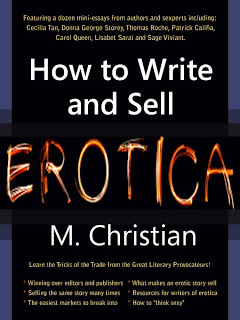In case you might be wondering what I’ve been up to lately, check out this link to the articles I’ve been doing for the great Future Of Sex site. Other things brewing, but writing about the sexuality of tomorrow has been a blast!
PENIS, COCK, DICK, MEMBER, ROD, ETC.
Erotic writing isn’t any different than any other form of writing: you still need a plot, characterization, description, a sense of place, suspension of disbelief, and so forth. Thinking otherwise will only put training wheels on your writing, which – believe me – readers and editors can easily pick up on. If you sit down and try to write a damned good story, that happens to be about sex or sexuality, the result will generally be much finer artistically than an attempt that’s just tossed off. The instant you approach a story as just anything, you’ll demean yourself and the reader. The bottom line is that there really isn’t much of a difference between a great erotic story and any other genre’s great story.
One difference between erotica and other genres is that erotica doesn’t blink: in just about every other genre, when sex steps on stage the POV swings to fireplaces, trains entering tunnels, and the like. In other words, it blinks away from the sexual scene. In erotica you don’t blink, you don’t avoid sexuality; you integrate it into the story. But the story you’re telling isn’t just the sex scene(s), it’s why the sex IS the story. Something with a bad plot, poor characterization, lousy setting, or lazy writing and a good sex scene is always much worse than a damned good story full of interesting characters, a great sense of place, sparkling writing and a lousy sex scene. The sex scene(s) can be fixed, but if the rest – the meat of the story itself – doesn’t work, you’re only polishing the saddle on a dead horse.
Aside the lack of blinking, the other difference erotica and other genres is repetition: a lot of people preach that it’s poor writing to use the same descriptive word too many times in the same section of writing. In other words:
The sun blasted across the desert, scorching scrub and weed into burnt yellow, turning soft skin to lizard flesh, and metal to rust. Outside LAST CHANCE FOR GAS, the radiation of the explosion had turned once gleaming signs for COCA-COLA and DIESEL into rust-pimpled ghosts of their former selves.
Parked outside LAST CHANCE, there was a rusted pickup collapsed onto four flat tires, the windshield a sparkling spider web under the hard white light of the sun’s explosion.
That wasn’t terrific, but the point is – aside from the poor metaphor of the sun as an explosion – the word rust springs up a bit too much. It’s not that bad a description, but having the same word pop up repeatedly comes off as lazy, unimaginative, or simply dull. To keep this from happening, many writing teachers and guides recommend varying the descriptive vocabulary. Now you don’t need to change rust to corrosion or decay or encrustation once you’ve used it once in a story, but if you need to use the same kind of description in the same paragraph or section, you might want to slip in some other, perhaps equally evocative, words as well.
But let’s go onto that exception for erotica. In smut, we have a certain list of words that are required for a well-written erotic scene: the vocabulary of genitalia and sex. If you follow the Don’t Ever Repeat rule in a sex scene, the results are often more hysterical than stimulating.
Bob’s cock was so hard it was tenting his jeans. He desperately wanted to touch it, but didn’t want to rush. Still, as he sat there, the world boiled down to him, what he was watching, and his penis. Finally, he couldn’t take it anymore. Carefully, slowly, he lowered his zipper and carefully pulled his dick out. Unlike a lot of his friends, Bob was happy with his member. It was long, but not too long, and had a nice, fat head. Unlike the rods his friends rarely described, his pole didn’t bend – but was nice and straight.
It’s another bit of less-than-brilliance, but, hopefully, you’ll get the idea: if you follow the non-repeat commandment, you’ll quickly run out of words to describe what the hell’s going on in your story. With women’s anatomy it gets even worse: I’ve read a lot of amateur stories that go from cunt to pussy to quim to hole to sex … somehow turning a down-and-dirty contemporary piece to a story that should be called Lady Rebecca and the Highwayman.
It’s more than perfectly okay to repeat certain words in a story – especially an erotic one – if other words just won’t work, or will give the wrong impression (is there anything less sexy than using hole or shaft?). My advice is to stick to two or three words that fit the time and style of the story, then rotate them: cock to dick, pussy to cunt, etc. Some words can also be used if you feel the story is getting a bit too thin on descriptions – penis, crotch, groin, etc. – but only if kept to a very dull roar.
One of the best ways to avoid this problem is to describe parts of the character’s anatomy rather than using a simple, general word. For example, lips, clit, glans, balls, shaft, mons, etc. Not only does this give you more flexibility, but it can also be wonderfully evocative, creating a complex image rather than a fuzzy impression of the party going on in your characters’ pants.
The bottom line is what while there is a core similarity between a good erotic story and any other genre, there are a few important stylistic differences – and, as the old saying goes: viva la difference!












